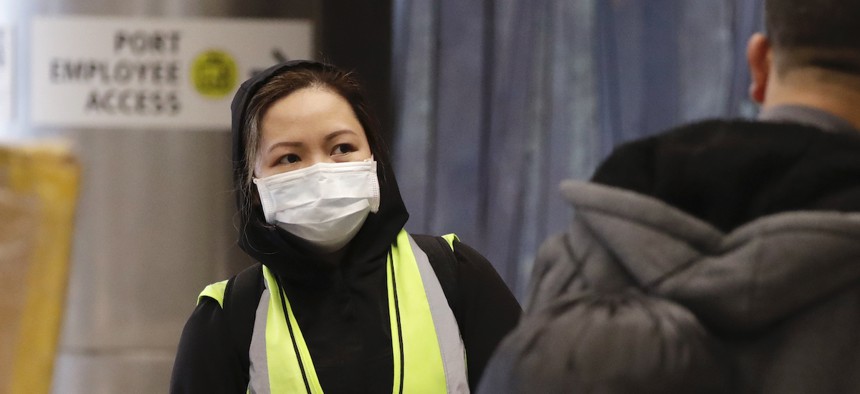Clinical Trial Underway for Coronavirus Treatment

An airport agent wears a protective mask as she waits to assist international travelers at SeaTac International Airport on Monday. Associated Press
It's the first test of a treatment for the virus, which federal officials said Tuesday was likely to continue spreading throughout the United States.
The federal government is conducting a clinical trial on a potential treatment for the novel coronavirus, officials said Tuesday.
The trial, underway at the University of Nebraska Medical Center in Omaha, is the first in the United States to evaluate a potential treatment for the COVID-19 virus, a respiratory disease first detected in December in Wuhan, China. Infection can cause mild to severe illness accompanied by fever, cough and shortness of breath.
As of Tuesday, there were 79,331 confirmed cases of coronavirus worldwide, including 14 in the United States, according to the Centers for Disease Control and Prevention (CDC). More than 2,600 people have died from the virus, and federal health officials told lawmakers and reporters Tuesday that they expect infections to continue throughout the United States.
“Ultimately we expect we will see community spread in the United States," Nancy Messonnier, a top official at the Centers for Disease Control and Prevention, told the Washington Post. “It’s not a question of if this will happen but when this will happen and how many people in this country will have severe illnesses.”
The virus is a new strain of an existing type of respiratory ailment and has no known treatment. The medication being tested in the trial, remdesivir, is an antiviral drug that has “shown promise in animal models for treating Middle East respiratory syndrome (MERS) and severe acute respiratory syndrome (SARS), which are caused by other coronaviruses,” according to the National Institutes of Health, the federal agency overseeing the trial.
The trial will be conducted at up to 50 sites globally, the agency said, but so far has just one participant: an American who returned home after being quarantined on the Diamond Princess cruise ship, which docked in Yokohama, Japan.
Trial participants must have a laboratory-confirmed case of coronavirus with respiratory symptoms, including rattling sounds when breathing or abnormal chest X-rays. Participants will be randomly assigned to either a group that will receive remdesivir or a placebo group, and neither group members nor researchers will know which people are receiving which treatment (known as a double-blind study).
“We urgently need a safe and effective treatment for COVID-19. Although remdesivir has been administered to some patients with COVID-19, we do not have solid data to indicate it can improve clinical outcomes,” Dr. Anthony S. Fauci, director of the National Institute of Allergy and Infectious Disease and a U.S. Coronavirus Task Force member, said in a statement. “A randomized, placebo-controlled trial is the gold standard for determining if an experimental treatment can benefit patients.”
Patients in both groups will be monitored by clinicians and assigned daily scores based on a scale that considers multiple factors, including body temperature, blood pressure and whether a person is using supplemental oxygen. Researchers will also take blood and nose and throat swabs from participants, which will be tested for signs of infection. Results will be compared and reviewed on day 15.
The trial will be overseen by an independent data and safety monitoring board to “ensure patient well-being and safety,” NIH said. The group will halt the study if there’s clear evidence that the drug is working.
News of the trial comes a day after federal officials announced they would begin a clinical trial for an experimental coronavirus vaccine. That trial, expected to begin in late April, will test the vaccine on around 25 participants, with results available this summer.
Kate Elizabeth Queram is a Staff Correspondent for Route Fifty and is based in Washington, D.C.
NEXT STORY: Better Rat Control in Cities Starts by Changing Human Behavior





